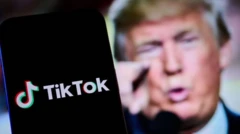Saving TikTok, the first challenge for Trump in the presidency and a preview of his relationship with China


Image source, Getty Images
- Author, Anthony Zurcher
- Author’s title, BBC North America correspondent
The Supreme Court of the United States denied TikTok’s request to suspend at the last minute the ban on it operating in the country.
For the popular social media platform to continue operating in the United States, it will have to be politicians or businessmen who facilitate it, not judges.
TikTok said it will be forced to “go offline” in the United States on Sunday, January 19 unless the government intervenes before the federal ban takes effect.
In a statement, the company noted that “both the White House and the Biden Department of Justice have failed to provide the necessary clarity and assurances to service providers who are essential to maintaining the availability of TikTok.”
Politicians are taking note, pressured to balance U.S. concerns about China with TikTok’s huge American user base. This includes the incoming president, who is himself a politician and businessman.
Shortly after the highest court’s ruling, President-elect Donald Trump said on his Truth Social social network that he would review the situation, but that everyone must respect the Supreme Court’s decision.
“My decision on TikTok will be made in the not-too-distant future, but I must have time to review the situation. Stay tuned!” he said.

Image source, Getty Images
Trump’s legal team intervened as the Supreme Court considered the case, asking the justices to delay the decision to give the Republican time to find a way out.
“Only President Trump has the consummate experience in negotiating agreements, the electoral mandate and the political will to negotiate a resolution that saves the platform,” reads the brief they presented.
Although the court did not comply with his wishes, several of Trump’s advisers have raised the possibility of a presidential executive order being issued Monday afternoon delaying the ban’s taking effect.
The American leader also spoke with Chinese President Xi Jinping, and the topic of TikTok came up.
Trump is staffing his foreign policy team with China hawks such as Marco Rubio and Michael Waltz, who represent a popular view on the right that the Chinese Communists are a geopolitical adversary rather than an economic rival.
An early victory
Last year, the incoming president campaigned for the support of social media influencers (and their young followers), many of whom are TikTok devotees.
If Trump can finally find a way to address national security concerns while keeping TikTok up and running in the United States, he would have a chance to score an early political victory in his second term, one that would be celebrated by loyal users. of the platform.
There is some irony in this, since it was conservatives, including Trump, who first advocated for a ban.
Joe Biden’s administration, for its part, seemed happy to leave the TikTok situation in the hands of the incoming president.
He was quick to issue a statement in response to the court’s decision, emphasizing that the goal of the law is not to ban TikTok, but to force its sale to American buyers.
However, as expected, the outgoing Democratic president attributed the ban’s entry into force to Trump, who will assume the presidency at noon Monday.

Image source, Getty Images
Constitutional protections
The Supreme Court, in its anonymous opinion without dissent, avoided commenting on political calculations. The justices sided with a lower court that upheld the constitutionality of the law that could ban the popular social media service if it is not sold by midnight Sunday.
While the court’s opinion is limited (the justices recognize the time pressure they had in issuing this decision), it firmly establishes that the constitutional protections for free speech contained in the First Amendment of the United States Constitution do not save TikTok .
In fact, the judges concluded that the ban had a lower bar than laws that directly regulate content.
Congress initially justified banning TikTok based on protecting national security by preventing an adversary from collecting large amounts of data on tens of millions of American users.
The court sidestepped other sensitive issues, such as whether concerns about Chinese influence on TikTok’s algorithm justified a ban. But that is expected to come up in future policy debates in Congress.
With this court decision, TikTok has exhausted its last legal recourse to prevent the ban from taking effect. For Trump, however, the TikTok ban is his first presidential challenge, but also his first political opportunity.

Subscribe here to our new newsletter to receive a selection of our best content of the week every Friday.
And remember that you can receive notifications in our app. Download the latest version and activate them.





